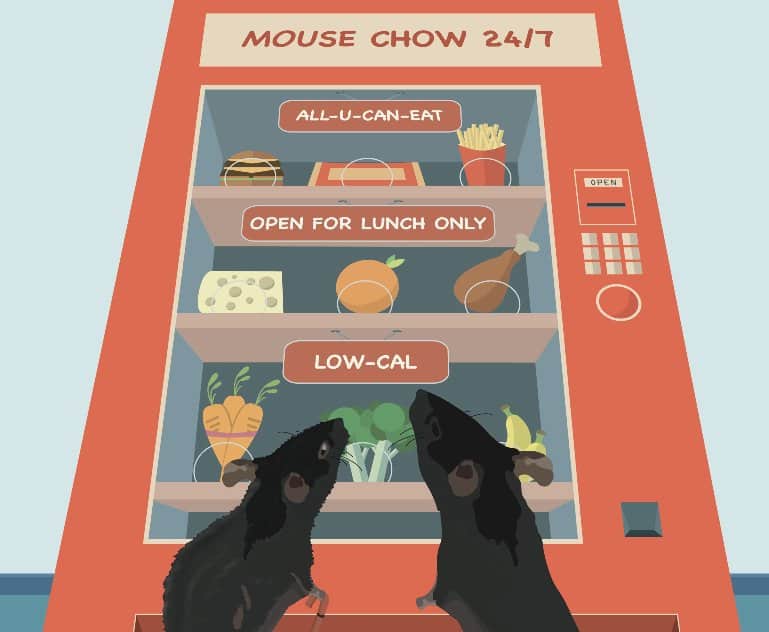Summary: Restricting calories and eating only during the most active part of the day helped extend the lifespan of mice.
Source: HHMI
One recipe for longevity is simple, if not easy to follow: eat less. Studies in a variety of animals have shown that restricting calories can lead to a longer, healthier life.
Now, new research suggests that the body’s daily rhythms play a big part in this longevity effect. Eating only during their most active time of day substantially extended the lifespan of mice on a reduced-calorie diet, Howard Hughes Medical Institute Investigator Joseph Takahashi and colleagues report May 5, 2022, in the journal Science.
In his team’s study of hundreds of mice over four years, a reduced-calorie diet alone extended the animals’ lives by 10 percent. But feeding mice the diet only at nighttime, when mice are most active, extended life by 35 percent. That combo—a reduced-calorie diet plus a nighttime eating schedule—tacked on an extra nine months to the animals’ typical two-year median lifespan. For people, an analogous plan would restrict eating to daytime hours.
The research helps disentangle the controversy around diet plans that emphasize eating only at certain times of day, says Takahashi, a molecular biologist at the University of Texas Southwestern Medical Center.
Such plans may not speed weight loss in humans, as a recent study in the New England Journal of Medicine reported, but they could prompt health benefits that add up to a longer lifespan.
Takahashi’s team’s findings highlight the crucial role of metabolism in aging, says Sai Krupa Das, a nutrition scientist at the Jean Mayer USDA Human Nutrition Research Center on Aging who was not involved with the work. “This is a very promising and landmark study,” she says.
Fountain of youth
Decades of research has found that calorie restriction extends the lifespan of animals ranging from worms and flies to mice, rats, and primates. Those experiments report weight loss, improved glucose regulation, lower blood pressure, and reduced inflammation.
But it has been difficult to systematically study calorie restriction in people, who can’t live in a laboratory and eat measured food portions for their entire lives, Das says. She was part of the research team that conducted the first controlled study of calorie restriction in humans, called the Comprehensive Assessment of Long-term Effects of Reducing Intake of Energy, or CALERIE. In that study, even a modest reduction in calories “was remarkably beneficial” for reducing signs of aging, Das says.
Scientists are just beginning to understand how calorie restriction slows aging at the cellular and genetic level. As an animal ages, genes linked to inflammation tend to become more active, while genes that help regulate metabolism become less active. Takahashi’s new study found that calorie restriction, especially when timed to the mice’s active period at night, helped offset these genetic changes as mice aged.
Question of time
Recent years have seen the rise of many popular diet plans that focus on what’s known as intermittent fasting, such as fasting on alternate days or eating only during a period of six to eight hours per day. To unravel the effects of calories, fasting, and daily, or circadian, rhythms on longevity, Takahashi’s team undertook an extensive four-year experiment. The team housed hundreds of mice with automated feeders to control when and how much each mouse ate for its entire lifespan.
Some of the mice could eat as much as they wanted, while others had their calories restricted by 30 to 40 percent. And those on calorie-restricted diets ate on different schedules. Mice fed the low-calorie diet at night, over either a two-hour or 12-hour period, lived the longest, the team discovered.
The results suggest that time-restricted eating has positive effects on the body, even if it doesn’t promote weight loss, as the New England Journal of Medicine study suggested. Takahashi points out that his study likewise found no differences in body weight among mice on different eating schedules—”however, we found profound differences in lifespan,” he says.


Rafael de Cabo, a gerontology researcher at the National Institute on Aging in Baltimore says that the Science paper “is a very elegant demonstration that even if you are restricting your calories but you are not [eating at the right times], you do not get the full benefits of caloric restriction.”
Takahashi hopes that learning how calorie restriction affects the body’s internal clocks as we age will help scientists find new ways to extend the healthy lifespan of humans. That could come through calorie-restricted diets, or through drugs that mimic those diets’ effects.
In the meantime, Takahashi is taking a lesson from his mice—he restricts his own eating to a 12-hour period. But, he says, “if we find a drug that can boost your clock, we can then test that in the laboratory and see if that extends lifespan.”
About this longevity research news
Author: Press Office
Source: HHMI
Contact: Press Office – HHMI
Image: The image is credited to Fernando Augusto
Original Research: Closed access.
“Circadian alignment of early onset caloric restriction promotes longevity in male C57BL/6J mice” by Victoria Acosta-Rodríguez et al. Science
Abstract
Circadian alignment of early onset caloric restriction promotes longevity in male C57BL/6J mice
Caloric restriction (CR) prolongs lifespan, yet the mechanisms by which it does so remain poorly understood. Under CR, mice self-impose chronic cycles of 2-hour-feeding and 22-hour-fasting, raising the question whether calories, fasting, or time of day are causal. We show that 30%-CR is sufficient to extend lifespan 10%; however, a daily fasting interval and circadian-alignment of feeding act together to extend lifespan 35% in male C57BL/6J mice.
These effects are independent of body weight. Aging induces widespread increases in gene expression associated with inflammation and decreases in expression of genes encoding components of metabolic pathways in liver from ad lib fed mice. CR at night ameliorates these aging-related changes.
Thus, circadian interventions promote longevity and provide a perspective to further explore mechanisms of aging.
